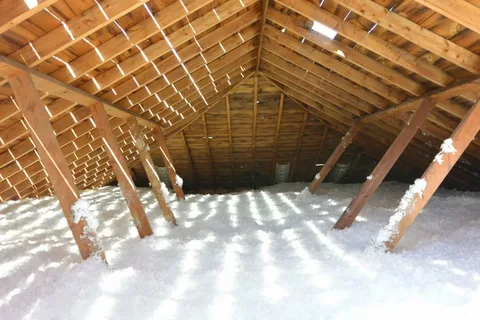Best Attic Insulation Contractor: in FLORIDA

Finding the right attic insulation contractor can make a significant difference in your home’s comfort, energy efficiency, and overall cost savings. When you choose a reliable and skilled professional, you ensure that your attic is properly insulated, keeping your home comfortable year-round and reducing energy costs. This guide will help you understand the importance of hiring the best attic insulation contractor and the benefits you can expect from their services.
Understanding Attic Insulation: Why It Matters
Attic insulation is crucial for maintaining a consistent indoor temperature by acting as a barrier to heat flow. Without proper insulation, your home can lose up to 25% of its heat through the attic, leading to higher energy bills and an uncomfortable living environment. A well-insulated attic not only reduces heating and cooling costs but also minimizes strain on your HVAC system, extending its lifespan.
Key Benefits of Hiring a Professional Attic Insulation Contractor
Expertise and Knowledge
A professional attic insulation contractor brings a wealth of knowledge and expertise to the job. They are trained to assess your home’s insulation needs and recommend the best materials and methods for your specific situation. Their experience allows them to identify potential issues that an untrained eye might miss, ensuring that your insulation is effective and long-lasting.
Quality Materials and Installation
Quality materials and proper installation are critical to the effectiveness of attic insulation. A skilled contractor will use high-quality insulation materials that are appropriate for your home’s climate and structure. They also have the tools and techniques necessary to install the insulation correctly, preventing gaps and ensuring maximum efficiency.
Energy Efficiency and Cost Savings
One of the primary reasons homeowners seek out an attic insulation contractor is to improve energy efficiency and reduce utility bills. Proper insulation helps maintain a consistent indoor temperature, reducing the need for constant heating and cooling. This not only lowers your energy consumption but also leads to significant cost savings over time.
How to Choose the Right Attic Insulation Contractor
Research and Recommendations
Start by researching local contractors and asking for recommendations from friends, family, or neighbors. Look for contractors with positive reviews and a proven track record of successful installations. Online reviews and testimonials can also provide valuable insights into a contractor’s reliability and workmanship.
Licensing and Insurance
Ensure that the contractor you choose is licensed and insured. This protects you from potential liabilities and ensures that the contractor meets the necessary legal and professional standards. A licensed contractor is also more likely to stay updated on the latest building codes and industry best practices.
Experience and Expertise
Choose a contractor with extensive experience in attic insulation. Their expertise will be invaluable in selecting the right insulation materials and methods for your home. Experienced contractors are also more likely to handle unexpected challenges efficiently, ensuring a smooth installation process.
Detailed Estimates
Request detailed estimates from multiple contractors before making a decision. A comprehensive estimate should include the cost of materials, labor, and any additional services. This allows you to compare pricing and ensure that you are getting the best value for your money. Be wary of contractors who offer significantly lower estimates, as this may indicate subpar materials or workmanship.
The Insulation Process: What to Expect
Initial Assessment and Consultation
The process begins with an initial assessment of your attic by the contractor. They will inspect the current insulation (if any), check for air leaks, and evaluate the overall condition of the attic. This assessment allows them to determine the best insulation strategy for your home.
Choosing the Right Insulation Material
Based on their assessment, the contractor will recommend the most suitable insulation material for your attic. Common options include fiberglass, cellulose, and spray foam, each with its own advantages. The contractor will explain the benefits of each material and help you make an informed decision.
Preparation and Installation
Before the installation begins, the contractor will prepare the attic by sealing any air leaks, repairing damaged areas, and ensuring that the space is clean and ready for insulation. The insulation is then installed according to the manufacturer’s specifications and industry best practices, ensuring a thorough and effective application.
Common Types of Attic Insulation
Fiberglass Insulation
Fiberglass insulation is one of the most common types used in attics. It is made from fine glass fibers and is available in batts, rolls, or loose-fill. Fiberglass is known for its durability, fire resistance, and affordability, making it a popular choice for many homeowners.
Cellulose Insulation
Cellulose insulation is made from recycled paper products and treated with fire retardants. It is an eco-friendly option that provides excellent thermal performance. Cellulose is often used in loose-fill form, which allows it to fill gaps and cover irregular spaces effectively.
Spray Foam Insulation
Spray foam insulation is a versatile and highly effective option that expands upon application, sealing gaps and creating an airtight barrier. It offers superior thermal performance and moisture resistance, making it ideal for areas with extreme weather conditions. However, it is typically more expensive than other insulation types.
FAQs About Hiring an Attic Insulation Contractor
1. How do I know if my attic needs more insulation?
You might need more insulation if you notice uneven temperatures in your home, increased energy bills, or drafts near your ceilings. An insulation contractor can perform an energy audit to determine if your attic insulation is sufficient.
2. What is the best type of insulation for attics?
The best type of insulation depends on your home’s specific needs and your budget. Fiberglass, cellulose, and spray foam are all effective options, each with its own benefits. A contractor can recommend the best type based on your home’s structure and climate.
3. How long does attic insulation last?
The lifespan of attic insulation depends on the material used. Fiberglass can last 20-30 years, cellulose 15-20 years, and spray foam can last indefinitely with proper maintenance. Regular inspections and maintenance can extend the life of your insulation.
4. Can I install attic insulation myself?
While it’s possible to install some types of insulation yourself, hiring a professional contractor ensures the job is done correctly and safely. They have the experience and tools necessary to install insulation that meets building codes and maximizes efficiency.
5. What factors affect the cost of attic insulation?
The cost of attic insulation can vary based on the size of your attic, the type of insulation material used, and the complexity of the installation. Requesting detailed estimates from multiple contractors can help you compare costs and find the best option for your budget.
Conclusion: Make the Smart Choice for Your Home
Investing in professional attic insulation services is one of the most effective ways to improve your home’s energy efficiency, comfort, and overall value. By hiring a reputable and experienced attic insulation contractor, you ensure that your insulation is installed correctly, providing long-lasting benefits. Whether you are located in Gainesville, Ocala, or Crystal River, choosing the right contractor can make a significant difference in the quality of your home’s insulation.
For the best results, consider reaching out to R-Factor Sprayfoam Solutions at (352) 663-5905. Their expertise and commitment to quality will help you achieve the comfort and savings you desire. Don’t wait—contact them today to get started on maximizing your home’s potential.




